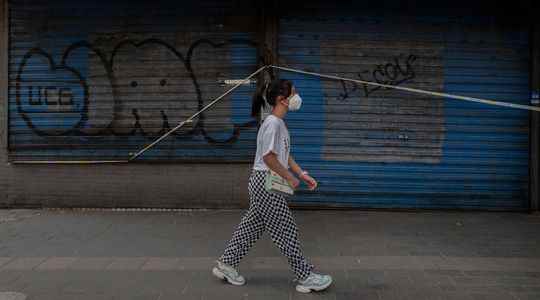The scene was filmed by surveillance cameras on June 10. It shows three women having dinner at a restaurant in Tangshan, Hebei province. A man approaches one of them, touches her back, she pushes him away: he then hits her violently in the face before dragging her outside by the hair and beating her, before kicking herself. take it out on other women. Nobody intervenes. Nine men were arrested for taking part in the attack. The video, seen nearly 5 billion times on the Weibo social network, shocked China. And revived the debate on violence against women in this country. “We all stand in solidarity with these victims, it’s a despicable act, comments Zhou, 19, on Xiaohongshu, a very popular platform among young Chinese women. Do we women have to fight every day to defend our rights and get respect.”
“Violence against women is a scourge, it affects at least half of the country’s women,” said Li Ping, a volunteer with the Equality Association (Wei Ping), an NGO defending women’s rights. Much of this violence takes place far from surveillance cameras, in the secrecy of homes; Nearly 1 in 4 married Chinese women are victims of domestic violence, according to a 2013 survey by the Chinese Women’s Association, an official NGO.
China passed its first law against domestic violence in 2016, but it remains poorly enforced. “Judge’s orders to remove an abusive husband are extremely difficult to obtain, and most shelters for women victims of domestic violence are unused, continues Li Ping. In addition, the law does not mention sexual violence, and rape spousal is not considered a crime.” “We have a lot of testimonies from battered women whose complaint was not taken into account by the police. She considers that it is a family problem that she should not get involved in,” adds Zhang, another volunteer. of the Equality association.
“Help! My husband is beating me!”
The Covid-19 outbreak has only made matters worse. In Shanghai, confined since the end of March, violence within couples has exploded: “We have recorded three times more complaints from women than usual since that date”, specifies Zhang, who recently witnessed a surreal scene. . One evening in May, she heard a loud noise in her building, followed by cries: “Help! Help! My husband is beating me!” She rushes upstairs, and finds the woman sitting on the floor on the landing, with marks from blows. Zhang calls the police, indicating that the victim needs treatment. Officers eventually arrive on the scene. One of them asks the injured woman if she wants to press charges. But he specifies that the two members of the couple would in this case be placed in detention. Frightened, the victim prefers to do nothing, but asks if we can still take him to a shelter. “Hold on until Shanghai lifts the lockdown,” the agent replies. The intervention lasted less than ten minutes.
“Women are not heard in China. The Communist Party believes that it would destabilize the country if all victims of sexual violence found a remedy in the courts, explains Leta Hong Fincher, in her book Betraying Big Brother. The Feminist Awakening in China (not translated). The government is therefore leading a vast campaign of repression against feminist activists. “China’s all-male leaders seem to think that the entire security state would collapse if there was no enslavement of women,” the journalist continued.
An attitude that has its roots in old Confucian morality and the so-called principle of the three obediences and four virtues which reduces women to the sole roles of daughter, wife and mother. The communist regime took up this principle by launching last year a major campaign to promote family values to relaunch a declining population. Given the drop in the number of marriages – 7.6 million last year, the lowest level since 1986 – some were not convinced.
